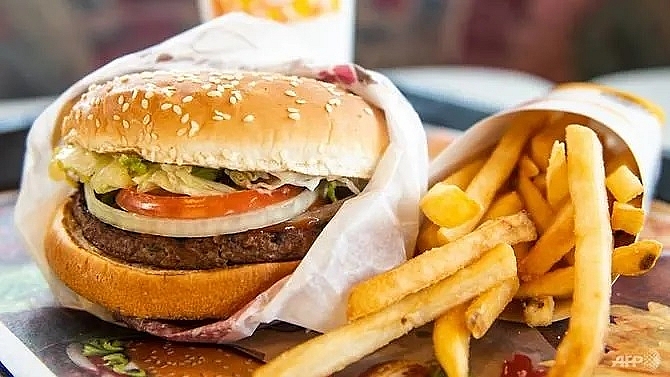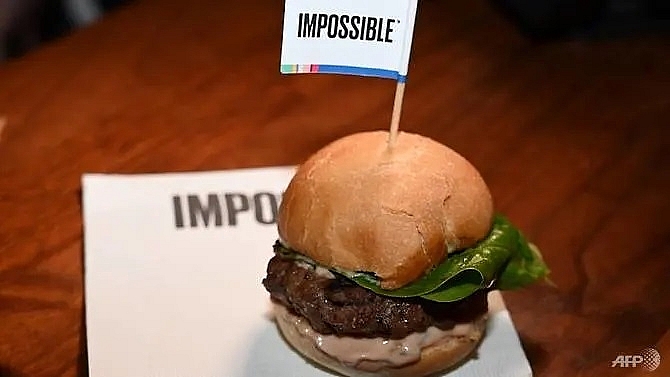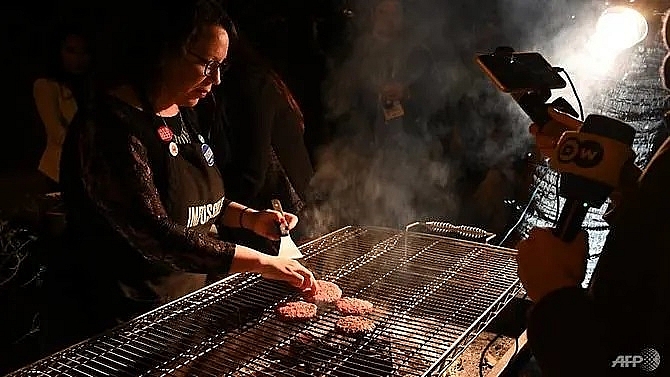Meat-based alternatives gain new popularity
 |
| In this file photo illustration taken on April 1, 2019, an 'Impossible Whopper' sits on a table at a Burger King restaurant in Richmond Heights, Missouri. (Photo: AFP/Getty Images North America/Michael Thomas) |
Here's an overview of the sector:
PLANT-BASED PRODUCTS
Soy steaks have been around for a long time and are a point of reference for organic stores. But several companies have spent recent years developing products further by using advanced technologies to imitate the taste, texture and even blood of conventionally raised animal meat.
They use beets, chickpeas and coconut oil, among others, to make "burgers," "sausages" and "steak".
 |
| In this file photo taken on January 07, 2019 The Impossible Burger 2.0, the new and improved version of the company's plant-based vegan burger that tastes like real beef is introduced at a press event during CES 2019 in Las Vegas, Nevada on January 7, 2019. (AFP/Robyn Beck) |
Among the most successful startups are Beyond Meat, which earlier this month made a celebrated Wall Street entry worthy of a major tech firm, or Impossible Burger, which has partnered with Burger King.
The companies are banking on changing dietary habits of part of the population limiting meat consumption for environmental, health or animal rights reasons.
CELL-BASED MEAT
The first burger created in a Petri dish using cells from cows was presented in 2013 following the work of Dutch scientist Mark Post of Maastricht University. It was dubbed the "Frankenburger."
 |
| In this file photo taken on January 07, 2019 The Impossible Burger 2.0, the new and improved version of the company's plant-based vegan burger that tastes like real beef is introduced at a press event during CES 2019 in Las Vegas, Nevada on January 7, 2019. (AFP/Robyn Beck) |
Several startups have since entered the fray in countries like Israel, Japan, the Netherlands and the United States to try to create pieces of chicken, duck, pork and fish using only animal cells.
They have not yet reached mass production in order to sufficiently lower prices. But American startup Memphis Meat and Mosa Meat of the Netherlands both announced they wanted to market products by 2021.
APPEALING ENOUGH FOR PUBLIC?
While sales of plant-based products aiming to replace conventional meat saw a 23 per cent boom in 2018, according to the Good Food Institute that promotes these alternatives, they still represent less than one percent of the total meat market in the country.
Investments in the sector remain minimal.
In 2018, US$673 million were invested in companies using plants to develop alternatives to meat, dairy and eggs, compared to US$96.9 billion invested in the agriculture technology sector and around US$25 billion in cannabis.
Danielle Beck of the National Cattlemen's Beef Association says the enthusiasm for these new products alone doesn't threaten cattle ranchers.
"Demand for proteins remains very strong. By 2050 (when the world population will reach nearly 10 billion people), it's going to take all the proteins we have," she said.
What the stars mean:
★ Poor ★ ★ Promising ★★★ Good ★★★★ Very good ★★★★★ Exceptional
Related Contents
Latest News
More News
- Russian President congratulates Vietnamese Party leader during phone talks (January 25, 2026 | 09:58)
- Worldwide congratulations underscore confidence in Vietnam’s 14th Party Congress (January 23, 2026 | 09:02)
- Political parties, organisations, int’l friends send congratulations to 14th National Party Congress (January 22, 2026 | 09:33)
- 14th National Party Congress: Japanese media highlight Vietnam’s growth targets (January 21, 2026 | 09:46)
- 14th National Party Congress: Driving force for Vietnam to continue renewal, innovation, breakthroughs (January 21, 2026 | 09:42)
- Vietnam remains spiritual support for progressive forces: Colombian party leader (January 21, 2026 | 08:00)
- Int'l media provides large coverage of 14th National Party Congress's first working day (January 20, 2026 | 09:09)
- Vietnamese firms win top honours at ASEAN Digital Awards (January 16, 2026 | 16:45)
- ASEAN Digital Ministers' Meeting opens in Hanoi (January 15, 2026 | 15:33)
- ASEAN economies move up the global chip value chain (December 09, 2025 | 13:32)

 Tag:
Tag:




















 Mobile Version
Mobile Version